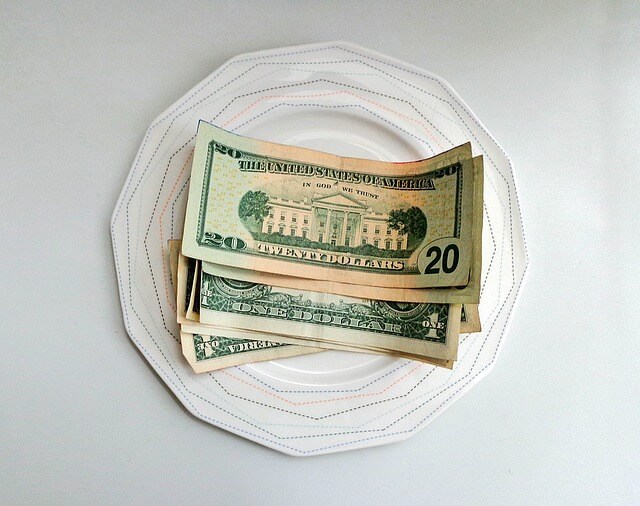If you wait tables, drive for Uber, or deliver food, you can always count on pocketing tips after serving satisfied customers. And these tips are probably the biggest part of your monthly income. Like most tipped employees, you may be unsure whether you need to report your tips to the IRS.
This guide will look to answer some of the common questions on do tips get taxed. Let’s get started.
Are Tips Taxable?
The IRS considers tips as taxable income -- just like monthly salaries and hourly wages. You have to pay income, Social Security, and Medicare taxes on tip earnings. And if you’re in a state that has imposed income tax, you may have to pay state taxes on it, too.
If you receive over $20 in tips in a given month, you need to report your tip earnings to your employer, who then withholds money from your paycheck for payroll tax. You don’t have to report your tip income to your employer if your earnings are less than $20.
Note that the $20 limit only applies to one employer. So if you’re working for multiple employers, then you’ll have to set aside a $20 limit for each one of them.
Let’s say you received $13 and $9 in tips from two gigs in the last month. You won’t have to report your earnings to either employer, as your tips are still within the $20 limit.
That said, according to the IRS, there are generally 4 types of tips, which include:
- Cash tips you receive directly from customers
- Tips you receive from customers paying via debit cards, credit cards, or other online payment methods like Cash App.
- Non-cash tips like tickets and items of value
- Earnings from tip-sharing agreements with other employees
Tip-sharing agreements are fairly common in most businesses, but they can be confusing for employees when reporting taxes. In such arrangements, workers split the pooled tip amount and report their share to their employer. Often, ‘background employees’ -- such as cooks, janitors, and dishwashers -- don’t receive a share from the tip pool.
With so many people involved, it can be difficult to know how much you need to pay for taxes from the agreement -- or if you’ll pay any tip taxes at all. But the answer is simple: you only need to report the amount you earned rather than the entire pool amount.
Suppose you receive a $200 tip. You give the valet $50 and the server $40, then you’ll only be paying tax on the $110 tip you brought home. When sharing tips, you only must report to the IRS your portion.
Who Exactly Are “Tipped Employees”?
If you earn at least $30 in tips per month, then you fall under the “tipped employee” category, according to the Fair Labor Standards Act (FLSA). As a tipped employee, you’re governed by a different set of regulations compared to the ordinary worker.
Minimum wage laws, especially, are applied differently. The federal minimum wage laws require employers to pay tipped workers at least $2.13 per hour in regular wages -- less than the $7.25 standard wage for other employees. The reason why? Tipped employees often earn enough tips to ensure their wage per hour at least equals the minimum threshold.
So, the FLSA gives employers greater leeway, allowing them to pay you less as long as your tip earnings make up the difference between your cash wage and the minimum wage. But what if you don’t earn enough in tips?
In such a case, your employer needs to pay the difference. This difference is known as the “tip credit”, and is a common payment practice in the industry. Here’s how you can calculate it:
Federal Minimum Wage - Tipped Minimum Wage = Tip Credit
Given the standard minimum wage is $7.25 per hour and the minimum wage for tipped employees is $2.13 per hour, then the tip credit is equal to:
$7.25 – $2.13 = $5.12 maximum tip credit
Note that the maximum tip credit varies from state to state and can often be as high as $9.17, as each state has its own standard wage and tipped minimum wage.
So, what happens when you earn more tips than what’s required to bring your earnings up to the standard wage? Can your employer take the remaining tips? You should realize that, according to the FLSA, an employer can’t force you to turn over your tips under any circumstances, unless there’s a legitimate tip pooling process.
Even if you receive the full federal wage from your employer, you can still retain all of your tip earnings.

Service Charges vs Tips
Service charges are fees that your employer automatically adds to a customer’s bill, and they can include:
- Delivery charges
- Gratuity for large parties
- Room service fees
- Bottle service charges
For this reason, the IRS doesn’t consider service charges as tips. Because for a payment to qualify as a tip, it needs to meet the following conditions:
- Your customer makes the payment on his own free will
- The giver has the right to decide the payment amount
- Your employer can’t negotiate or dictate the payment
- The customer determines the receiver of the payment
To the IRS, service charges are like regular wages. Your employer has to withhold income tax and social security tax on them. So you’ll probably receive your portion of service charges on payday rather than after your regular shifts.
How To Keep Track of Tips
When you receive tips through credit cards, debit cards, or online payment platforms, tracking your earnings is often straightforward. However, in some businesses -- like casinos -- reporting tip income can easily overwhelm you, as you’re mostly receiving them in cash (which you'll still be responsible for paying taxes on).
That’s why you need to record your total tips received or earnings after each shift to simplify the process and make it less cumbersome.
The IRS requires you to report tips to your employer by the 10th day of the following month that you earned them. You need to submit this report in writing, which should include:
- Your current address
- Your legal name and social security number
- Your employer’s legal name and current address
- The period the report covers
- The total amount of tips you earned throughout the period
Let’s say you receive $350 in tips in May. The deadline for reporting these tips to your employer is June 10. If 10th June falls on a weekend day or holiday, then you need to submit your report the next business day.
It’s advisable to keep copies of documents, such as charge slips and bills, that prove your tip income. Alternatively, you can keep a personal tip diary and update it daily with accurate tip amounts and dates.
But the best option is to use Form 4070A: Employee’s Report of Tips to Employer. The form is similar to a workbook; it has space for daily entries that you can use to keep accurate records.

Reporting Your Tips to the IRS
When you receive Form W-2 from your employer, you’ll typically find your total tip earnings for the year in Box 1. This amount is crucial as you’ll use it to report your tips to the IRS using Form 1040. You need to add this amount as well as all the other tips you didn’t report to your employer throughout the year. For instance, the tips that fell under the $20 limit need to be reported as taxable income to the IRS.
What Happens If You Don’t Report Your Tips?
It can be tempting to hide your tip income and avoid taxes. With all the late-night shifts and tasks at hand, you probably don’t have the time to keep track of $25 tips. But you need to be careful; underreporting your tip income carries some dangerous consequences.
For one, you risk being audited. Even though the chances of it happening are rare -- especially if you are a server or a taxi driver -- you can claim a tipped income that’s too low for the organization to ignore.
The IRS usually compares your reported income to the earnings of other tipped employees in your area. Unreported tip income often warrants an investigation.
Also, remember that credit card and debit card tips leave a paper trail that the IRS can trace.
If found out, the penalties can be harsh. Underreporting tax income attracts a fine of up to 50% of the Social Security and Medicare taxes you owe, plus an additional 20% of the income taxes you haven’t paid. Also, keep in mind that intentionally hiding your income is treated as a criminal offense by the IRS.
Here are other reasons why you need to avoid underreporting your income:
- It can cost you your Social Security benefits when you retire. The Social Security Administration needs proper records of earnings to determine your benefits.
- You risk being eligible for unemployment insurance covers and workers’ compensation programs.
- It can affect the amount you contribute to 401(k)s
- You risk being ineligible for mortgages and loans. Banks require proof of income to determine whether they can lend to you.
For employers, the consequences of failing to misreport tips also apply. If the IRS suspects that an employer hasn’t been reporting accurate tips, then they’ll likely send a series of notices. And if the employer still doesn’t comply, then they’ll get audited. When the IRS discovers that an employer has been intentionally hiding their income, then the organization can fine them up to $10,000.
To avoid all the hefty IRS fines that come with misreporting your income, you can use a 1099 tax calculator. Knowing the exact amount you owe the IRS can help you save money; you won’t pay more taxes than required and you won’t lose money from penalties.
How to Resolve Unreported Tips
There are some situations when you might accidentally misreport your income when filing your returns. For instance, tips worth less than $20 -- which you didn’t report to your employer -- can easily go under the radar.
If you want to catch up on the tips you’ve overlooked throughout the year, then you’ll need Form 4137. It allows you to report tip income that your employer isn’t aware of, calculate the additional taxes you owe, and come clean on your returns.
Be aware, though, the IRS can still slap you with the penalties we mentioned earlier: 50% of owned Social Security and Medicare tax and 20% of owed income tax (plus the additional taxes you’ve underreported).
But you can escape these fines by making certain to the organization that you didn’t have any malicious intent when you failed to report your tips. You can state your case by attaching a return statement to your income tax return.
Form 4137 is readily available on the IRS website, where you can get instructions on how to fill out the form.






